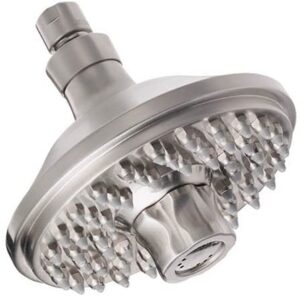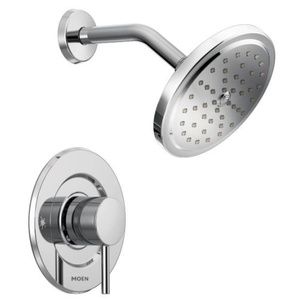How often to replace a shower head? That’s a vexing question many visitors to ‘A Rainshower Head‘ ask.
The answer varies depending on several factors, including the quality of the shower head, the frequency of use, and the type of water in the area.
In another article we talked about how to replace a rainshower head. In this one, let’s discuss how often to replace a shower head.
Quality of the Shower Head

One of the most significant factors that determine how often a shower head should be replaced is the quality of the shower head.
- Cheap shower heads are more likely to break down and deteriorate faster than higher quality shower heads.
- The material and design of the shower head can also affect its lifespan. Metal shower heads are generally more durable and long-lasting than plastic shower heads, which may crack or break over time.
If you have a high-quality shower head, it may last for several years without needing to be replaced. However, if you have a lower quality shower head, you may need to replace it every 1-2 years.
Frequency of Use
Another factor that can impact how often you should replace your shower head is the frequency of use.
If you use your shower very often, your shower head may wear out more quickly than if you only use it occasionally. This is especially true if you have hard water, which can cause mineral buildup and clog the shower head’s spray nozzles.
If you use your shower daily or multiple times a day, you should consider replacing your shower head every 1-2 years.
However, if you only use your shower a few times a week, you may be able to stretch the lifespan of your shower head to 2-3 years.
Type of Water
The type of water in your area can also impact how often you should replace your shower head.
Hard water, which contains high levels of minerals such as calcium and magnesium, can cause mineral buildup and clog the shower head’s spray nozzles. This can reduce water flow and make it more difficult to get a consistent and comfortable shower experience.
If you have hard water in your area, you may need to replace your shower head more frequently than if you have soft water.
Soft water, which has low levels of minerals, is less likely to cause mineral buildup and clog your shower head’s spray nozzles. If you have soft water, you may be able to extend the lifespan of your shower head to 3-4 years.
Signs that Your Shower Head Needs to be Replaced

In addition to the factors discussed above, there are several signs that may indicate that your shower head needs to be replaced.
These signs include:
- Reduced water pressure: If you notice that your shower head is not producing as much water pressure as it used to, it may be time to replace it. Mineral buildup and clogs can reduce water flow and make it more difficult to get a comfortable and consistent shower experience.
- Rust or corrosion: If your shower head is showing signs of rust or corrosion, it may be time to replace it. Rust can weaken the metal and cause leaks, while corrosion can affect the shower head’s performance and lifespan.
- Cracks or damage: If your shower head has cracks or other damage, it may be time to replace it. Cracks can cause leaks and affect the shower head’s performance, while damage can weaken the material and reduce its lifespan.
In Summary
How often to replace a shower head? The answer is that it depends on several factors.
These include:
- quality of the shower head,
- frequency of use, and
- type of water in your area.
If you have a high-quality shower head, use your shower infrequently, and have soft water, you may be able to extend the lifespan of your shower head to 3-4 years.
However, if you have a lower quality shower head, use your shower frequently, and have hard water, you may need to replace your shower head every 1-2 years.
It is also important to keep an eye out for signs that your shower head needs to be replaced, such as
- reduced water pressure,
- rust or corrosion, and
- cracks or damage.
If you notice any of these signs, it is best to replace your shower head as soon as possible to avoid further damage or issues.
It is a relatively easy and affordable to replace a shower head. And doing it can significantly improve your shower experience.
Newer shower heads offer various features such as adjustable spray settings, water-saving options, and improved water pressure, making them a worthwhile investment.
